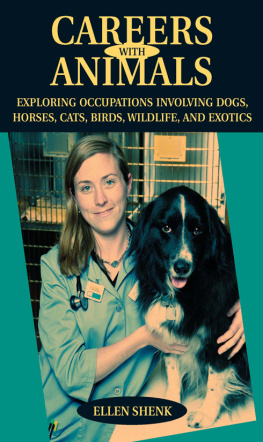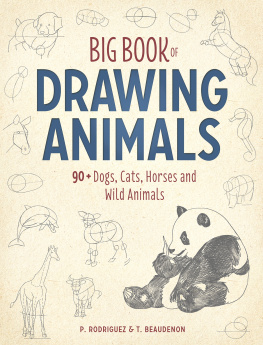Acknowledgments
I n the process of researching, organizing, and writing the book I had help from a great many people. Adequately thanking everyone will be impossible but I need to try. To begin with, I thank my friends and family, who provided support and encouragement through the long months of researching, writing, and decision-making, especially Philip, who took me to the wild cat sanctuary and helped me deal with my innate aversion to reptiles at the reptile zoo. My editors at Stackpole provided invaluable help in both the writing and the editing. Mark Allison gave suggestions and feedback at times when I needed both, in addition to editing; Chris Chappells editing and attention to production details eased the final steps in bringing the book to publication. Both were extremely capable and very pleasant to deal with.
Although a great deal of the information for the book came from the Internet, books, and magazine articles, experts in various fields and organizations were extremely helpful in sharing their knowledge and in reading and critiquing portions of the book. In the process these strangers became friends. It is virtually impossible to name them all. Although they include the individuals profiled in the book, many other people generously shared their knowledge. I am very grateful for their help.
Ellen Shenk

Chapter 1
Choosing Your Career
Successful careers seldom happen by chance. With very few exceptions, people who really get what they want in a career do so because they define clear objectives, develop plans and schedules for achieving their objectives, assume personal responsibility for implementing and following these plans, monitor their progress regularly, improve their plans when they arent getting the desired results, and persevere in the face of frequent setbacks until their objects are achieved.
Nicholas Weiler, Reality and Career Planning
P eople choose careers in various ways. Some simply accept any position that is available and looks interesting. Others take a job because they know someone who does that type of work or works for the same organization. Still others take time for some self-assessment to discover who they really are and what they can and want to do. They then do research to learn what kinds of careers fit the type of person they are.
The fact that you have picked up this book probably means that you fall into this last category. Because many careers require extensive training, it is wise to research carefully before making your choice. Even if you are quite certain which career you wish to enter, take a little time to be sure you are headed in the best possible direction for the unique person you are.
One of the first steps in choosing a career is to complete a personal inventory. This will help you better define your unique characteristics and what you want to do. Important components are your interests, skills, and values.
You chose to read this book because work with animals is important to you. What you need to decide is what role animals should play in your career. Do you want to work directly with animals, deal with a subject matter that relates to animals, work for an organization that is concerned with animals, or a combination of these? Consider these options as you continue to read this book.
INTERESTS
Your interests are one key factor in career decision-making. It is important to select a field in which you will be working with issues, content, subject matter, or animals that you care about. It is much more pleasant to spend thirty-five to forty or more hours a week doing work that greatly interests you than something that bores you. Being aware of your interests can help you identify potential work environments and employers.
As you work through the following exercises picking out your skills and values, use interest as a criterion to keep or eliminate items from your list. For example, although you may be skilled at drawing, you may not like to do it. Picking a career that uses a skill, however well developed, that doesnt interest you would be counterproductiveyou would not really enjoy that career.
SKILLS
When you examine different careers, its important to know whether your skills match those required for that career. If you have completed a skills inventory, you will be able to decide whether a particular career is a good fit for you.
A skill is generally defined as something you do well. Some of your skills may come to mind immediately. But because we arent always tuned in to the things we do well, it is a good idea to spend some time assessing your skills.
The following list contains some of the skills you should consider. As you read through these skills, write down those that apply to you. Consider skills you have used in clubs, extracurricular activities, or hobbies, as well as on part-time or volunteer jobs or in school.
administer
analyze
arrange
assemble
build
calculate
coach
coordinate
counsel
create
delegate
design
dramatize
edit
evaluate
explain
formulate
fund-raise
guide
interpret
interview
investigate
keep records
listen
manage
measure
mediate
negotiate
observe
organize
persuade
plan
predict
print
promote
question
recruit
repair
research
sell
sketch
speak
publicly
supervise
talk
teach
translate
troubleshoot
write
This list is by no means exhaustive; you will want to add other skills that occur to you. Also, as you write down your skills, its helpful to add an example of a situation when you used each one. For example, you might note under keep records that as a 4-H club treasurer for three years, you kept accurate records of the membership dues paid and the results of special sales projects.
VALUES
Also vital to consider when making a career choice are your values those things that are most important to you. Values provide satisfaction and add purpose and fulfillment to life. Often people do not realize that their values dont match those of their chosen profession until they are well into a career. Figuring out this part of the career match before you make other choices can help you avoid problems later on.
Read the following list and write down the values that are important to you.
| achievement | perform important roles and be involved in momentous endeavors |
| autonomy | be free to work with little supervision and set your own schedule and priorities |
| distinction | be well known, be seen as successful, and have recognition and status in your chosen field |
| expertise | become a respected and trusted expert in your field |
| friendship | like and be liked by the people with whom you work |
| leadership | be an influential and respected leader |
| location | be able to live and work in the places you choose |
| pleasure | find enjoyment and have fun doing your work |
| power | be able to approve or disapprove different courses of action, make assignments, and control allocations and outcomes |
| security | obtain a secure and stable position |
| self-realization | do work that is challenging and allows you to fully develop your talents |
| service | help people in need and contribute to the satisfaction of others |
| wealth | earn a great deal of money so that you can be financially independent Jot down any other values that are important to you. At this stage of the decision-making process, it is helpful to write down as much information about yourself as possible. |









